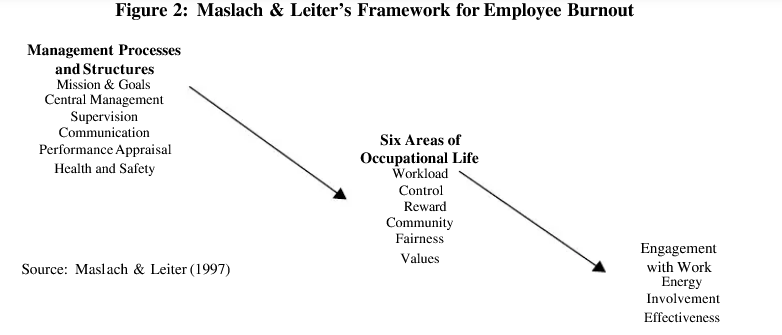(More on Stress cont. 4)
Another Framework on Stress
It is based on 6 areas of occupational life

More on the 6 areas of occupational life
i) workload (finding the balance between productivity of the organisation, and time and energy for the individual)
ii) control (degree of autonomy or control people have over their work; the degree of decision-making, ie
"...People want the opportunity to make choices and decisions, to be able to use their ability to think and to solve problems, and to have some input into the process of achieving the outcomes for which they will be accountable. Failure to feel a sense of control over one's work can lead to a lack of motivation and job satisfaction and, ultimately, to a sense of powerlessness..."
C. Maslach et al as quoted by Beverley McNally, 2000
iii) reward (needs to be meaningful; can be internal and/or external like money, status/prestige, security, etc)
iv) community (it is a sense of belonging that exist when people work together; about personal relationships)
v) fairness ( there are 3 elements to this, ie trust, openness and respect)
vi ) values (they influence everything about one's relationships at work)
NB
"...when an organisation is like a community, people trust one another to fulfill their roles on shared projects, to communicate openly about their intentions and showed mutual respect..."
C. Maslach et al as quoted by Beverley McNally, 2000
However, It has been found
"...employees at risk concentrate on surviving, maintaining status, prestige, power and careers......that can created destructive competition amongst employees and greatly detract from achieving the organisational goals and requirements..."
J. Invancevich as quoted by Beverley McNally, 2000
"...the environment becomes highly individualistic and focused on survival of the fittest......evidence of individual political manoeuvring in order to maintain career or position......organisations also suffer, as there is not a willingness amongst members to share knowledge......loss of......freedom of staff to work outside their usual hierarchical structures..."
Beverley McNally, 2000
Furthermore, in many organisations, people who work together also socialise together. Thus redundancies not only affect the workplace but also the social communities. Additionally, people remaining within the organisation will grieve the loss of their colleagues, ie survival syndrome.
Surviving one change process does not make it is any easier with the next one.
"...rather than the issue of stress being seen as a problem for the individual, or any stress or stress-related illness being seen as a sign of weakness, there needs to be a move towards recognition of the problem as an organisational or industry issue. While traditional stress management techniques will go some way towards alleviating the symptoms of stress, they will not remove the cause..."
Beverley McNally, 2000
